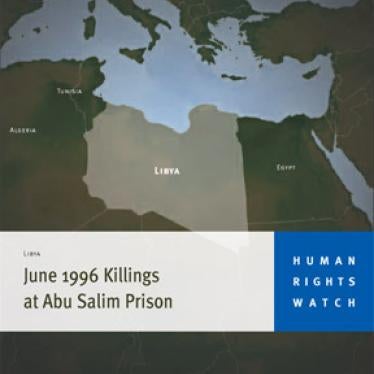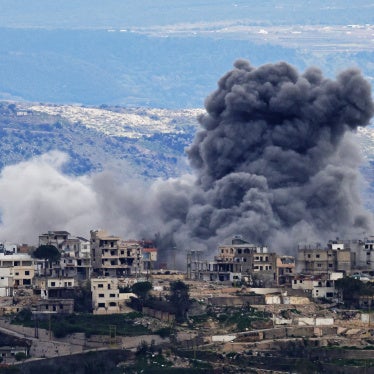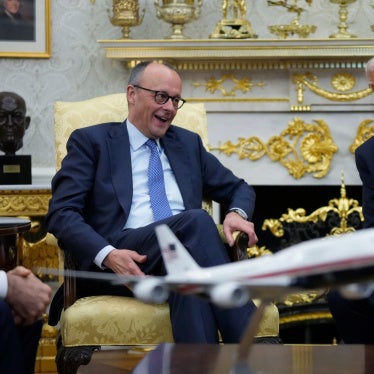(New York) - Colonel Mu'ammar al-Gaddafi should mark his 40th anniversary in power by wiping repressive laws off the books and freeing political prisoners, Human Rights Watch said today. Notwithstanding movements toward reform in the past five years, laws and policies that restrict the most basic rights and freedoms of Libyan citizens remain in force, and Libyans are not free to criticize the government or to form political associations.
"Gaddafi's Great Green Charter of Human Rights promised that ‘all human beings will be free and equal in the exercise of power,'" said Sarah Leah Whitson, Middle East and North Africa director at Human Rights Watch. "Forty years later, Libyans are still waiting for their rights."
Limited steps toward increased press freedom, legal reforms, and increased tolerance of dissent indicate that at least some elements of the government recognize the need for reform. Two new private newspapers and the internet have created a new limited space for freedom of expression, and some unprecedented public demonstrations have taken place.
The Justice Ministry has announced plans to reform the most repressive provisions of the penal code, but has not yet made the proposed revisions public. The justice system at times has made independent decisions, ordering the government to pay compensation to people whose rights have been violated. But many trials, especially those before the State Security Court, still fail to meet international due process standards. Overall, unjustified limits on free expression and association remain the norm, including penal code provisions that criminalize "insulting public officials" or "opposing the ideology of the Revolution."
"Business deals with other countries aren't going to improve Libya's human rights reputation," Whitson said. "That won't happen until Libya abolishes laws that restrict speech and association, frees its political prisoners, and prosecutes government officials responsible for past crimes."
Human Rights Watch went to Libya on a research mission in April 2009, meeting with the secretary of the General People's Committee for Justice, the justice minister, the secretary of the General People's Committee for Public Security, and the interior minister, as well as other officials. Two reports detailing its findings will be issued this year.
Freedom of expression, assembly, and association
Freedom of expression is severely restricted by the Libyan penal code, which criminalizes acts such as "insulting public officials" and "promoting anti-state theories." However, in the past five years, there has been a gradual opening of a new, still-vulnerable, space for freedom of expression. Libyans have access to more information through establishment of two private newspapers and a satellite TV station, along with the spread of international satellite stations and the availability of Libyan news websites based abroad. This gradual opening has brought with it an increase in media criticism of government policies, as well as increase in the number of prosecutions of journalists, although no journalist has been sentenced to prison so far.
Libyan laws also severely restrict freedom of association. Law 71 bans any group activity opposing the ideology of the 1969 revolution, and the penal code imposes the death penalty on those who join those groups. The Libyan association law (Law 19) also restricts freedom of association by requiring any new organization to have 50 founding members and to apply for certification giving the General People's Congress full discretion to refuse an application without justification or appeal. For example, Libya's Internal Security Agency blocked an attempt in the summer of 2008 by a group of lawyers and journalists to set up an independent human rights organization.
In a further step backward, on June 29, the General People's Committee issued a decision (312/2009) requiring 30-day advance approval from a newly established government committee to hold any meeting or event, and requiring the meeting organizers to provide a list of all participants and the issues to be discussed. Under international law, though, these requirements do not meet the standard of a necessary or proportionate limitation to freedom of assembly and association.
"Libyan authorities should reform the penal code and law on associations to bring them fully in line with international standards for freedom of expression and association," said Whitson. "Issuing a decree that further stifles freedom of assembly gives the wrong signal. It should be revoked."
Unlimited detention
By the Justice Ministry's own reckoning, about 200 prisoners who have served their sentences or who have been acquitted by Libyan courts remain imprisoned under orders of the Internal Security Agency. Internal Security, under the Interior Ministry, controls two prisons, Ain Zara and Abu Salim, where "security" detainees are held. Internal Security has refused to carry out judicial orders to free these prisoners, despite calls from the justice minister for their release.
For example, a dual UK-Libyan citizen, Mahmoud Boushima, remains imprisoned in Abu Salim prison, despite a Supreme Court decision on March 30, 2008 ordering his release. Boushima, who had been living in the United Kingdom since 1981, returned to Libya on July 17, 2005. Eleven days later, Internal Security officers arrested him, and the state security prosecutor charged him with membership in an illegal organization. A court acquitted him on March 18, 2005, a decision confirmed by appeal on February 20, 2007. His case eventually came before the Supreme Court , which further upheld his acquittal in the 2008 decision. Human Rights Watch asked to meet with him in April, when it visited Abu Salim prison, but prison authorities denied access to him.
Political prisoners
Libyan prisons still contain dozens of prisoners who were sentenced after unfair trials for expressing their political views. Over the past two years, however, a number of political prisoners have been freed. Earlier this year, Libya released the last of a group of 14 prisoners arrested in 2007 for organizing a demonstration.
One prisoner whose case has received little attention is Abdelnasser Al-Rabbasi, whom Human Rights Watch interviewed in Abu Salim prison in Tripoli in April. He is serving a 15-year sentence for writing a novel about corruption and human rights. On January 5, 2003, Internal Security officers in plainclothes arrested him at his home and then held him incommunicado for six months. On August 18, 2003, the People's Court handed down the prison sentence for "dishonoring the guide of the revolution" (as Gaddafi is called) under article 164 of the penal code.
Rabbasi told Human Rights Watch that, "I'm not part of any group or anything like that," and that all the officers found in his home were some of his writings.
"The Libyan government should free all prisoners detained for the peaceful expression of their opinion," said Whitson. "It should ensure that the decisions of Libyan courts are respected and that court orders for the release of prisoners from Abu Salim and Ain Zara are implemented."
Justice for the 1996 Abu Salim prison killings
Up to 1,200 prisoners were killed on June 29, 1996 in Abu Salim prison, but the Libyan authorities have yet to make public any investigation into the incident or to hold anyone responsible. From 1996 until late 2008, the vast majority of the families of the prisoners who were killed sought news of their fate but received no information about them. In 2007, some of the families went to court over the issue, and in June 2008, the North Benghazi Court ordered the government to reveal the fate of those who had died.
As a result, Libyan authorities started issuing death certificates to the families in December, without acknowledging that the deaths were related to the 1996 incident, and offering compensation of 200 thousand Libyan Dinars (US$162,300) in compensation if the family agreed to relinquish all legal claims. But most of the families in Benghazi have refused to accept compensation on those terms.
Mohamed Hamil Ferjany, a spokesperson for the families now based in the United States, told Human Rights Watch that for him, "the money is irrelevant." He added: "My family spent years suffering, not knowing where my brothers were, only to be given a piece of paper 15 years later saying they are dead and nothing more. We want justice."
Some of the families insisting on accountability from the government have held protests in Benghazi over the past months. They have formed a committee to present their demands, which include revealing the facts about what occurred on the day of the killings and trying those responsible. In a positive sign, the government has, for the most part, allowed the families to demonstrate, and the Libyan press has at times covered their activities and demands. However, the families also have faced harassment from security forces and even, at times, arrest.
Under the International Covenant on Civil and Political Rights, the right to life and to an effective remedy implies the duty to investigate violations and inform the families of the victims of the circumstances of death. If any crime was involved in deaths caused by state authorities, the perpetrators should be identified and prosecuted.
"It's not enough to issue death certificates and pay out a sum of money to surviving family members of this terrible event," said Whitson. "The government needs to provide a full accounting of what happened, and punish those officials responsible for wrongdoing."






